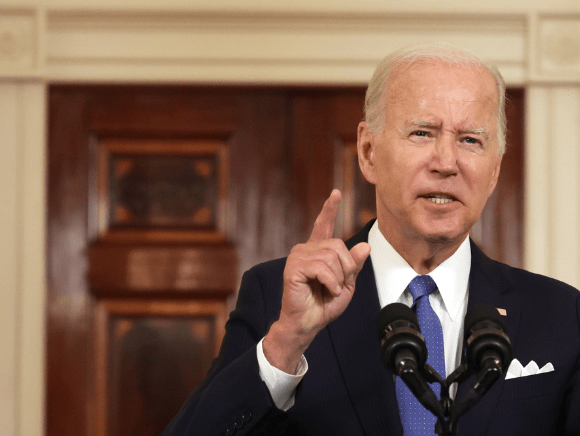
(Photo by Alex Wong/Getty Images)
Walking away from one of the most incendiary media addresses any president may have ever made – expressing his personal displeasure with the Supreme Court overturning of Roe V. Wade – Joe Biden now heads to Europe to represent the US at a G-7 meeting in Germany on June 25 and a NATO summit in Spain on the 28th. The shadow of Biden’s piqued and red-faced unpresidential comments will no doubt follow him to the meetings. However, with Ukraine’s President Volodymyr Zelensky also heading to the G-7 and NATO gatherings, the impact of what the US president has said regarding US domestic affairs may be reduced.
 “Officials say Ukraine will remain at the forefront of the discussions at both summits,” according to a report in The Washington Examiner. Before the G-7 meeting kicks off at Schloss Elmau in the Bavarian Alps, Biden will meet with German Chancellor Olaf Scholz with NATO’s continuing support for Ukraine at the top of the agenda. The meeting with Scholz will be “a good opportunity for the president to check signals with Germany at the top, as well as to affirm the enduring ties between our two countries and our continued coordination on a broad range of global challenges,” Fox News reported, quoting a senior White House official.
“Officials say Ukraine will remain at the forefront of the discussions at both summits,” according to a report in The Washington Examiner. Before the G-7 meeting kicks off at Schloss Elmau in the Bavarian Alps, Biden will meet with German Chancellor Olaf Scholz with NATO’s continuing support for Ukraine at the top of the agenda. The meeting with Scholz will be “a good opportunity for the president to check signals with Germany at the top, as well as to affirm the enduring ties between our two countries and our continued coordination on a broad range of global challenges,” Fox News reported, quoting a senior White House official.
The official explained that, in addition to European security, the administration would support four focus areas: “We will roll out a concrete set of proposals to increase pressure on Russia and demonstrate our support for Ukraine. We will address the impact of Putin’s war on prices rising at home and over the world… Leaders will also advance a vision of the world grounded in freedom and openness, not coercion, not aggression, not spheres of influence.” Also, the president will address “challenges posed by China.” Lastly, an effort to “advance a common vision of a world grounded in freedom and openness will be the official launch of our global infrastructure partnership that will lift up our low- and middle-income partner countries…”

Joe Biden arriving in Bavaria (Photo by Daniel Karmann/picture alliance via Getty Images)
As a prelude to the G-7 discussions, Secretary of State Antony Blinken participated in ministerial-level meetings in Berlin, Germany, before joining President Biden in Bavaria. Setting the stage for the G-7 talks, Blinken pushed initiatives to “address food insecurity, stemming from both Russia’s brutal, unprovoked war against Ukraine and the continued challenges posed by climate change, the COVID-19 pandemic, and other conflicts, and supply chain challenges,” the State Department said in a press statement.
During the White House background press briefing, the senior administration official explained that Biden would meet with President Pedro Sánchez of Spain, the host country, before the NATO summit. The purpose of this meeting is, “So, it’ll be a good opportunity for the president to check signals with him [Sánchez],” the official offered. Checking signals will be an important outcome of the president’s trip. Regarding the NATO summit, “Russia obviously continues to be the most serious and immediate threat to the Alliance. But the Strategic Concept will also address the multifaceted and longer-term challenges posed by the PRC to the Euro-Atlantic Security,” the administration spokesperson continued. Regarding a question from the press about US support for including Sweden and Finland in NATO, “There is very strong Allied support for Finland and Sweden’s membership applications, including here in the administration, and also what we’ve seen reflected in Congress.”
The G-7 and NATO summits are significant opportunities for the US to recommend and support meaningful international policy. The Biden administration’s leadership is always on display, and any hiccup in the White House team’s comportment reflects poorly on US statesmanship. Unfortunately, the overture to the US chief executive’s trip to Europe was an ill-advised emotional outburst on a domestic issue. International forums’ successful outcomes rely on thoughtful views to instill confidence in US leadership.
The views expressed are those of the author and not of any other affiliation.
Remember to check out the web’s best conservative news aggregator
Whatfinger.com — the #1 Alternative to the Drudge


